Very few Americans (5%) say that the way Hamas carried out its Oct. 7 attack against Israel was acceptable, but a somewhat larger share (22%) view Hamas’ reasons for fighting Israel as valid.
Responding to a parallel set of questions about Israel, most Americans (58%) describe Israel’s reasons for fighting Hamas as valid, but the U.S. public is more divided over Israel’s conduct of the war. On balance, 38% say it is acceptable, while 34% say it is unacceptable. (The rest aren’t sure or decline to answer.) These figures include nearly identical shares of Americans who say the way Israel is responding to Hamas is completely acceptable (21%) and completely unacceptable (20%).
A majority of U.S. adults (57%) say they sympathize at least to some extent (or equally) with both Israelis and Palestinians. In general, Americans express more positive views of the Israeli people than of the Israeli government. Similarly, more Americans express favorable attitudes toward the Palestinian people than toward either the Palestinian Authority or Hamas.
Views of the war and its key players vary greatly by age. For example, adults under 30 are more likely than older Americans to say Hamas has valid reasons for fighting Israel, and young U.S. adults express a more favorable view of the Palestinian people than of the Israeli people.
The rest of this chapter explores these topics in greater detail, highlighting key differences between political parties and religious groups.
How Hamas is fighting Israel
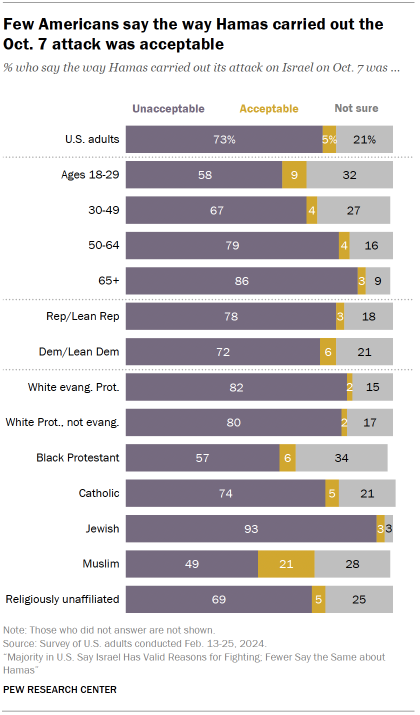
Some 5% of Americans say the way Hamas carried out its attack on Israel on Oct. 7 was completely or somewhat acceptable. Nearly three-quarters say it was unacceptable (73%), including 66% who consider it completely unacceptable. One-in-five are unsure whether Hamas’ actions were acceptable.
Relatively few Americans across the demographic and religious groups analyzed in this report consider the way Hamas carried out the Oct. 7 attack to be acceptable. But about one-in-five U.S. Muslims say it was acceptable, including 11% who describe it as somewhat acceptable and 10% who call it completely acceptable.
Why Hamas is fighting Israel
About one-in-five Americans say that regardless of how acceptable they find the way Hamas carried out the Oct. 7 attack, its reasons for fighting Israel are valid (22%), though just 6% say its reasons are completely valid.
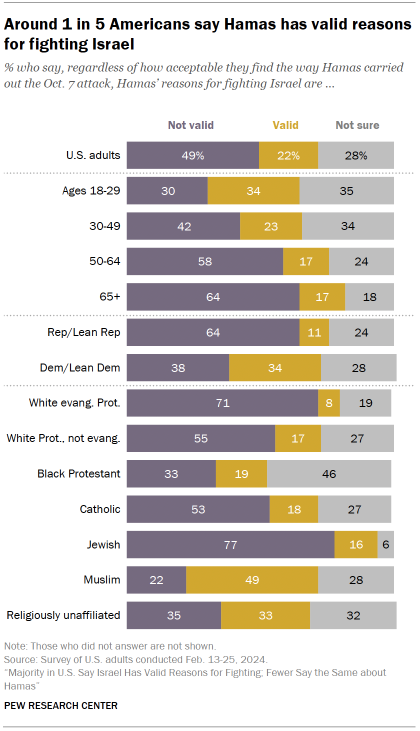
Roughly half say Hamas’ reasons for fighting are not valid, including 34% who say they are not at all valid. And 28% of the public is uncertain whether Hamas has valid reasons for fighting Israel.
Age
Americans ages 18 to 29 are more closely divided than the overall public on this question. About one-third of young adults say Hamas’ reasons for fighting are valid, including 12% who say they’re completely valid and 22% who say they are somewhat valid.
Three-in-ten adults under 30 say they are not valid, including 13% who say they are not too valid and 17% who say they’re not at all valid, with 35% unsure.
By contrast, Americans ages 65 and older tend to register strong disapproval of Hamas on this question as well as on others throughout the survey. Nearly two-thirds (64%) say Hamas’ reasons for fighting Israel are not valid, including 49% who say they are not at all valid.
Adults ages 30 to 64 fall in between, producing an overall pattern in which the tendency to say that Hamas does not have valid reasons for fighting rises with age.
Party
Democrats and independents who lean toward the Democratic Party are far more likely than Republicans and Republican leaners to say that, regardless of how acceptable they find the way Hamas carried out the Oct. 7 attack, they think Hamas’ reasons for fighting Israel are at least somewhat valid (34% vs. 11%). Most Republicans (64%) say the reasons why Hamas is fighting are not too or not at all valid.
While it’s a minority opinion across the board, younger Democrats and Republicans, particularly those under 30, are more likely to view Hamas as having valid reasons for fighting Israel. For example, 44% of Democrats ages 18 to 29 say Hamas’ reasons for fighting are valid, compared with one-third or fewer among Democrats ages 30 and older.
Religion
Roughly half of Muslims and atheists (49% each) say that regardless of how acceptable they find the way Hamas carried out the Oct. 7. attack, they think Hamas’ reasons for fighting Israel are valid. Just 8% of White evangelical Protestants share this view. Besides atheists, the other two groups that make up the religiously unaffiliated group (often called “nones”) are somewhat less likely to say Hamas has valid reasons for fighting: 42% of agnostics and 24% of those who identify religiously as “nothing in particular” say this.
Combining questions of Hamas’ acceptability and validity
Putting the two questions together – how and why Hamas is fighting – 47% of the U.S. public says Hamas’ Oct. 7 attack was neither acceptable (in its means) nor valid (in its ends). Just 3% of Americans say both that the way Hamas carried out its Oct. 7 attack was acceptable and that Hamas has valid reasons for fighting Israel.
Still, some Americans express mixed views: 17% say Hamas has valid reasons for fighting Israel, but that the way it carried out the Oct. 7 attack was unacceptable. Almost no survey respondents (1%) take the reverse position (that Hamas has no valid reason for fighting, yet the Oct. 7 attack was acceptable). A sizable share of the public (29%) isn’t sure about the acceptability of Hamas’ means, the validity of its ends, or both.
How Israel is fighting Hamas
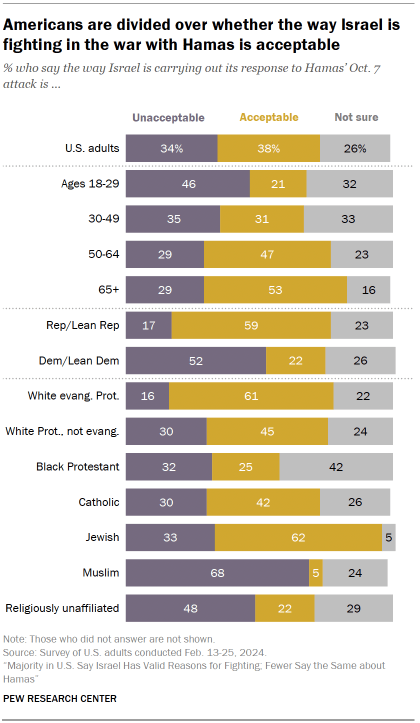
Around four-in-ten Americans (38%) say the way Israel is carrying out its response to Hamas’ Oct. 7 attack is acceptable, including 21% who say it is completely acceptable. About a third say Israel’s response is completely (20%) or somewhat (14%) unacceptable, and 26% are not sure.
Age
Older Americans are about twice as likely as younger ones to say that Israel’s conduct of the war is acceptable. Around half of those ages 50 and older say Israel’s methods are acceptable, while nearly three-in-ten call them unacceptable.
Adults under 30 are the least likely age group to say Israel’s response is acceptable: 46% of Americans ages 18 to 29 say the way Israel is carrying out the war is unacceptable, including 32% who call it completely unacceptable.
At the same time, young Americans also are more likely to say they are unsure about the acceptability of Israel’s response. One-third of adults under 50 say this, compared with 20% of U.S. adults ages 50 and older.
Party
About six-in-ten Republicans and GOP leaners (59%) say that the way Israel is carrying out its response to Hamas’ Oct. 7 attack is acceptable, including 39% who say it is completely acceptable. Far fewer Democrats and Democratic leaners agree (22%). About a third of Democrats (32%) say Israel’s response is completely unacceptable.
Religion
Most Jewish Americans (62%) and White evangelical Protestants (61%) see Israel’s response to the Oct. 7 Hamas attack as at least somewhat acceptable, including roughly four-in-ten in each group who say Israel’s conduct of the war is completely acceptable.
Most Muslim Americans (68%), on the other hand, describe Israel’s methods as unacceptable. About half of religiously unaffiliated adults (48%) say the same. This includes especially large shares of atheists (68%) and agnostics (57%).
About half of atheists (50%) and Muslims (55%) say that the way Israel is carrying out the war against Hamas is completely unacceptable.
Why Israel is fighting Hamas
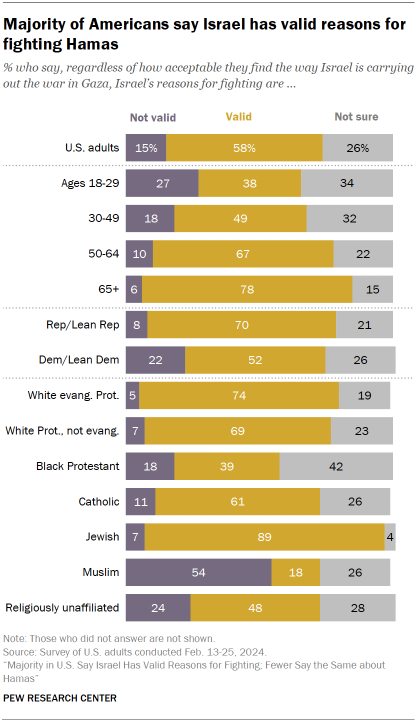
Regardless of how acceptable they find the way Israel is carrying out the war in Gaza, most U.S. adults (58%) say Israel’s reasons for fighting Hamas are at least somewhat valid, including 35% who say the reasons are completely valid. Relatively few (15%) say Israel’s reasons are not too or not at all valid, and around a quarter are unsure.
Age
Older Americans are far more likely than younger Americans to say they understand why Israel is fighting.
Nearly eight-in-ten Americans ages 65 and older say Israel has valid reasons to fight, as do two-thirds of those ages 50 to 64. Half of Americans in their 30s and 40s say the same. U.S. adults under 30 are the only age group in which fewer than half (38%) feel Israel’s reasons for fighting Hamas are valid.
But these figures also reflect the fact that on this question young adults are, again, more likely than their older counterparts to express uncertainty. One-third of respondents under 50 say they are unsure whether Israel’s reasons for fighting are valid, compared with 19% of those ages 50 and older.
Party
Seven-in-ten Republicans say Israel’s reasons for fighting Hamas are valid, including around half who say Israel’s reasons are completely valid. Fewer Democrats say Israel’s reasons for fighting are either completely or somewhat valid (52%); their most common response is to say Israel’s reasons are somewhat valid (30%).
Overall, older people in both political parties are far more likely than their younger counterparts to feel that Israel has good reasons for fighting. For example, 86% of Republicans ages 65 or older – as well as 74% of Democrats in this age group – say Israel’s reasons for fighting Hamas are valid. By comparison, 48% of Republicans and just 35% of Democrats under 30 agree.
Religion
Nine-in-ten U.S. Jewish adults (89%) say that, regardless of how acceptable they find the way Israel is carrying out the war in Gaza, Israel’s reasons for fighting Hamas are at least somewhat valid, including 74% who say its reasons are completely valid.
Most White evangelical Protestants (74%), White nonevangelical Protestants (69%) and Catholics (61%) also say Israel’s reasons are at least somewhat valid, as do about half of religiously unaffiliated Americans (48%). On the other hand, 54% of U.S. Muslim adults say Israel’s reasons for fighting Hamas are not too or not at all valid, though 18% say they are at least somewhat valid.
Combining questions of Israel’s acceptability and validity
Combining the survey questions about how and why Israel is fighting, 35% of the U.S. public says both that Israel has valid reasons for fighting Hamas and that the way Israel is carrying out the war is acceptable. At the other end of the spectrum, 13% of respondents indicate that neither Israel’s methods nor its reasons are acceptable to them.
Once again, there are also some mixed views: 19% of adults say Israel’s reasons for fighting are valid, but its conduct of the war is unacceptable. Far fewer (2%) take the reverse position – that Israel’s conduct in the war is acceptable, but it doesn’t have good reasons to fight Hamas. And sizable shares express uncertainty about how Israel is fighting, why it is fighting, or both.
Are there valid reasons for both Hamas and Israel to be fighting?
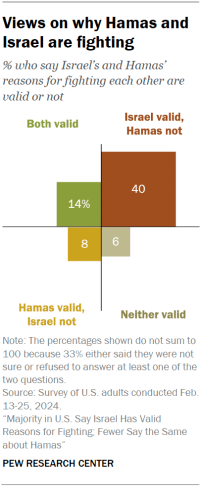
Combining these questions in a different way, we can see that 40% of U.S. adults say Israel has valid reasons for fighting but Hamas does not, while 8% say Hamas has valid reasons but Israel does not. Altogether, 14% of Americans say that both Israel and Hamas have valid reasons for fighting each other, and 6% say that neither side has valid reasons for going to war.
Age
Relatively small shares of Americans across age groups say both Israel and Hamas have good reasons for fighting (between 12% and 16%). However, U.S. adults under 30 are most inclined to view Hamas’ reasons – but not Israel’s – as valid (16%). At the other end of the spectrum, Americans 65 and older are the most inclined to say Israel’s reasons are valid while Hamas’ are not (58%).
Party
Nearly six-in-ten Republicans (57%) say Israel’s reasons for fighting Hamas are valid but that Hamas’ reasons for fighting Israel aren’t.
Democrats are more evenly split: 27% say that Israel’s reasons for fighting are valid but that Hamas’ reasons are not, and 13% say the reverse. Another 20% say that both sides have valid reasons for fighting. Fewer (8%) say neither side has a valid reason.
Religion
Religiously unaffiliated adults are more likely than those who affiliate with a religion to say that both Israel and Hamas have valid reasons for going to war (18% vs. 12%). This view is especially common among atheists (26%) and agnostics (24%).
Most Jews (75%) and White evangelical Protestants (65%) in the United States say Israel has valid reasons for fighting but Hamas does not. On the flip side, Muslim Americans are more inclined than those from other religious groups to say that Hamas has valid reasons for fighting but that Israel doesn’t (37%).
Are the tactics of both Hamas and Israel unacceptable?
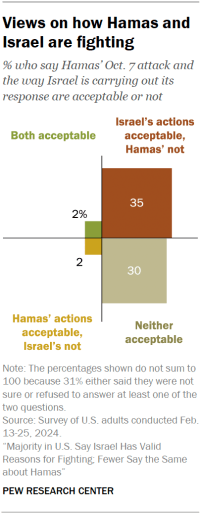
An alternative way to combine the questions that focuses on how both sides are fighting finds that 35% of U.S. adults think Israel’s response to Hamas’ Oct. 7 attack is acceptable while Hamas’ attack itself was unacceptable.
Slightly fewer (30%) say both sides are fighting in an unacceptable manner. Almost no one says that either both sides’ conduct is acceptable (2%) or that Hamas’ Oct. 7 attack was acceptable but Israel’s response has not been (2%). Still, 31% are unsure or did not answer at least one of these questions.
Age
Similarly small shares of Americans across age groups say both Israel and Hamas are fighting in an acceptable manner (between 1% and 3%). However, U.S. adults under 30 are among the most inclined to say neither side is acceptable (35%). At the other end of the spectrum, Americans ages 65 and older are the most inclined to say the way Israel is carrying out its response to Hamas’ Oct. 7 attack is acceptable while the attack from Hamas was unacceptable (51%).
Party
Among Democrats, 45% say the way both sides are fighting is unacceptable, with another 19% saying Israel’s response has been acceptable but the Oct. 7 attack was unacceptable. Most Republicans (57%) say Israel’s response has been acceptable while Hamas’ attack was unacceptable, with 15% describing both sides’ conduct as unacceptable.
Religion
Most Jews (60%) and White evangelical Protestants (59%) in the U.S. say Israel’s response to the Oct. 7 attack is acceptable while Hamas’ attack was unacceptable. Still, 31% of Jews say the way both sides are fighting is unacceptable. Among White evangelical Protestants, only 15% call both sides’ fighting unacceptable, while a quarter say they are unsure.
Muslims (44%) and the religiously unaffiliated (41%) are the most likely to say both sides are behaving unacceptably. Among the religiously unaffiliated, the share describing both sides’ conduct as unacceptable is particularly high among atheists (57%) and agnostics (49%).
Muslims stand out as the group most likely to say Hamas’ original attack was acceptable but Israel’s response has not been (17%).
Views on why and how both groups are fighting, by age and party
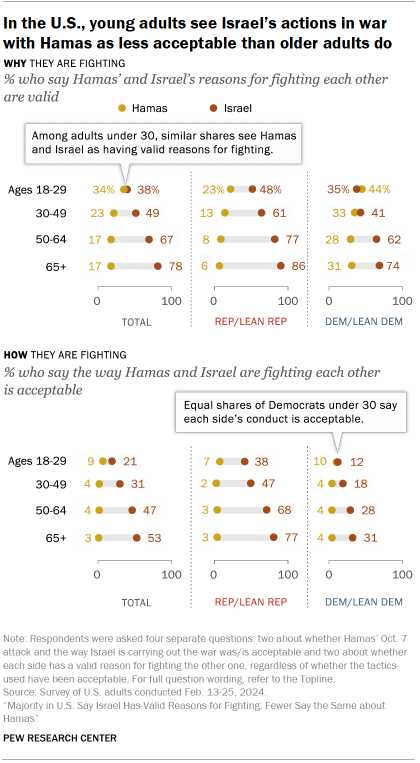
Younger U.S. adults, particularly those under 30, stand out for their distinctive views on how and why the war is being fought. Notably, younger Americans are about equally likely to say that Israel (38%) and Hamas (34%) have valid reasons for fighting.
Older Americans take a much different stance. Those ages 65 and older are about four times as likely to say that Israel’s reasons for fighting are valid as they are to say that Hamas’ reasons are valid (78% vs. 17%).
Like the public overall, younger Americans are more likely to approve of the way Israel is carrying out its response (21% say it’s acceptable) than to condone the way Hamas carried out its initial attack (9%). But the gap is much smaller among Americans ages 18 to 29 than it is among those ages 65 and older (53% vs. 3%).
Democrats under 30 are especially skeptical about Israel’s reasons for fighting. More say Hamas has valid reasons for fighting than say the same about Israel (44% vs. 35%).
And the youngest Democrats are about as likely to consider Hamas’ Oct. 7 attack acceptable (10%) as they are to call Israel’s military response acceptable (12%).
How do Americans describe their sympathies in the war?
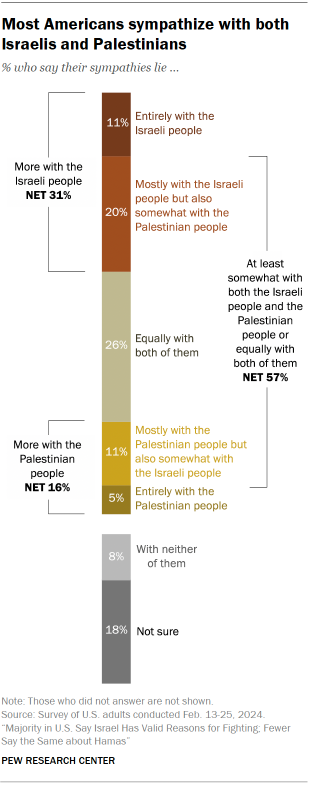
Three-in-ten Americans (31%) sympathize entirely or mostly with the Israeli people, while 16% sympathize entirely or mostly with the Palestinian people and 26% say they sympathize with both sides equally. Another 18% are unsure where their sympathies lie.
Looked at another way, most U.S. adults (57%) are conflicted or ambivalent. They either:
- Sympathize mostly with the Israeli people but also somewhat with the Palestinian people;
- Sympathize mostly with the Palestinian people but also somewhat with the Israeli people;
- Or they express equal sympathy with both sides.
Age
Compared with older Americans, adults under 30 are more likely to say they sympathize entirely with the Palestinian people (14%). Older Americans (ages 50 and older), on the other hand, are more likely than their younger counterparts to say they sympathize entirely with the Israeli people (16%).
But on balance, older Americans are more likely to say they have conflicting feelings. About two-thirds of adults ages 65 and older say they sympathize mostly with the Israeli people but also somewhat with the Palestinian people (30%); mostly with Palestinians but also somewhat with Israelis (8%); or equally with both sides (27%). Half of adults under 30 (51%) are similarly conflicted.
Young adults are more likely to be uncertain how they feel: A quarter of 18- to 29-year-olds say they aren’t sure where their sympathies lie, compared with 11% of the 65-and-older age group.
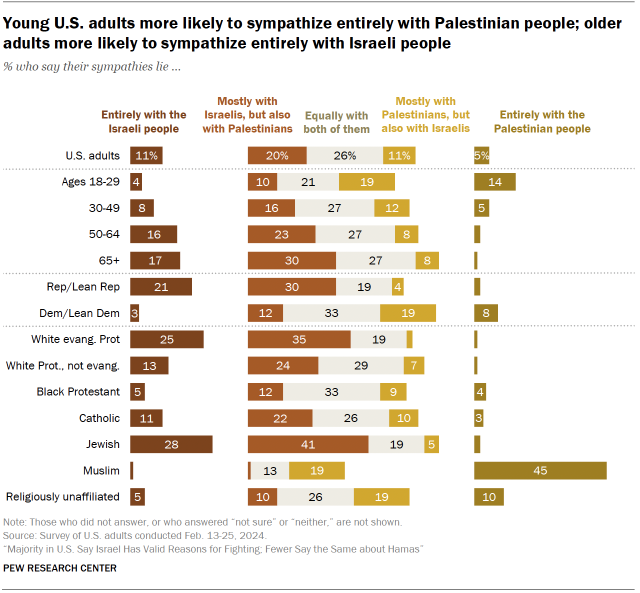
Party
One-in-five Republicans and Republican leaners (21%) say they sympathize entirely with the Israeli people, and 53% sympathize with both the Israeli and Palestinian people to some degree. Few (2%) feel entirely sympathetic toward the Palestinian people.
Democrats, on the other hand, most commonly say they sympathize with both groups (64%), though slightly more side entirely with the Palestinian people (8%) than with the Israeli people (3%).
Younger Republicans and Democrats are less likely than their older counterparts to sympathize with Israelis. Indeed, Democrats under 30 are far more likely to say they sympathize entirely with the Palestinian people (20%) than with the Israeli people (2%), though 56% have conflicted sympathies.
Religion
About three-in-ten Jewish Americans (28%) and one-quarter of White evangelical Protestants say they entirely sympathize with the Israeli people; but large shares in each group have conflicted sympathies (65% and 56%, respectively).
Muslim Americans are more likely than the other religious groups analyzed to say they sympathize entirely with the Palestinian people (45%), while 32% either sympathize equally or at least somewhat with both Israelis and Palestinians.
Views of Israelis and Palestinians, the Israeli government, the Palestinian Authority and Hamas
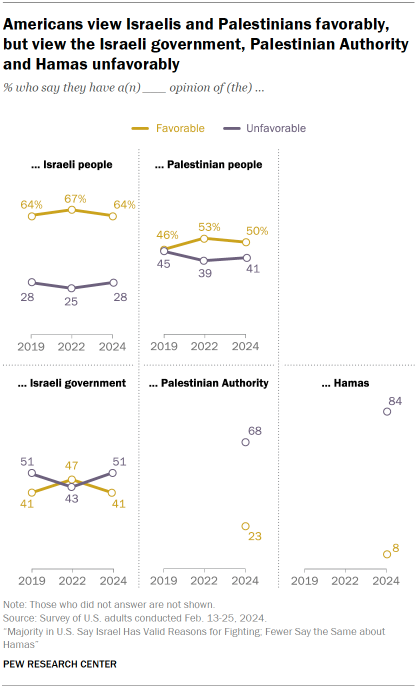
Americans continue to express more positive than negative views of both Israelis and Palestinians, as has been the case in recent years.
More Americans have a favorable view of the Israeli people (64%) than of the Palestinian people (50%). Still, favorable views of each have dropped slightly since 2022 (3 percentage points each).2
When it comes to opinions of leadership, 41% voice a favorable view of the Israeli government, down from 47% in 2022 but on par with 2019. (The 2022 survey was the only one of these three survey dates where Prime Minister Benjamin Netanyahu was not in office.)
This survey asked about views of the Palestinian Authority and Hamas for the first time. (In the past, we had asked about “the Palestinian government.”) Roughly a quarter of the U.S. public (23%) takes a favorable view of the Palestinian Authority, which controls the West Bank, while just 8% have a favorable view of Hamas, which has controlled Gaza in recent years.
Related: When Americans think about Israel, what do they have in mind?
The Israeli people
While roughly two-thirds of Americans express a favorable view of the Israeli people, 28% have an unfavorable view, and 8% did not answer the question.
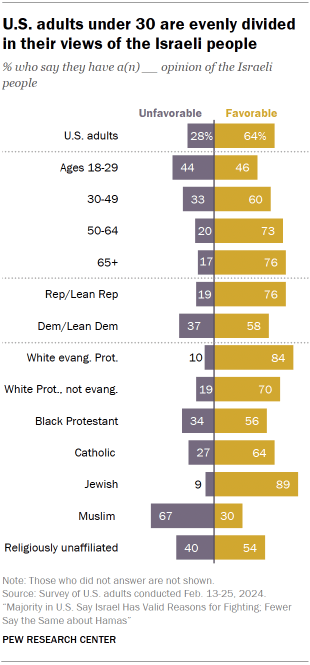
Age
U.S. adults under 30 are about evenly divided, with 46% having a favorable view of the Israeli people and 44% having an unfavorable view. By comparison, most older Americans express much more favorable than unfavorable views of the Israeli people.
Favorable views of the Israeli people have ticked downward 17 points among adults under 30 since 2019, when 63% had favorable views (58% said the same in 2022). Views of the Israeli people are generally more stable among older Americans.
Party
Three-quarters of Republicans and Republican-leaning independents (76%) have a favorable view of the Israeli people, compared with 58% of Democrats and Democratic leaners.
Younger people in both partisan camps are less likely than their older counterparts to hold a favorable view of the Israeli people. For example, 42% of Democrats under 30 say they have a favorable view of the Israeli people, compared with 69% of Democrats ages 65 and older.
But young Republicans are more likely than young Democrats to have a favorable view of the Israeli people (60% vs. 42% among those ages 18 to 29).
Overall, favorability toward the Israeli people has remained stable among Republicans since 2019, but it has dropped slightly among Democrats, from 62% in 2022 to 58% now.
Religion
Large majorities of U.S. Jews (89%) and White evangelical Protestants (84%) say they have a favorable view of the Israeli people, as do smaller majorities of White nonevangelical Protestants (70%) and Catholics (64%).
Upward of half of Black Protestants (56%) and religiously unaffiliated Americans (54%) also have a favorable view of the Israeli people.
Muslim Americans, on the other hand, largely express unfavorable views of the Israeli people (67%).
The Palestinian people
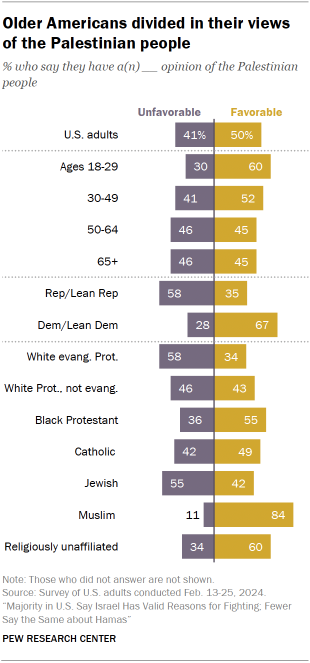
Half of Americans have a very or somewhat favorable view of the Palestinian people, while 41% have a somewhat or very unfavorable view.
Age
Six-in-ten U.S. adults under age 30 express positive views of the Palestinian people. Older Americans are more divided in their stance, particularly those ages 50 and older – 45% have a favorable view, while 46% have an unfavorable one.
Among adults under 30, views of the Palestinian people have held steady since 2019. But favorable views have dropped slightly among Americans ages 50 and older, from 49% in 2022 to 45% in 2024, moving closer to the 2019 level (41%).
Party
Democrats (67%) are far more likely than Republicans (35%) to have a favorable view of the Palestinian people. Democrats’ views of the Palestinian people have held steady over the last two years, but Republicans are slightly less likely to take a favorable view of the Palestinian people than in 2022.
Religion
Fully 84% of Muslims say they have a favorable view of the Palestinian people, as do 60% of religiously unaffiliated Americans. Atheists (71%) and agnostics (69%) have especially positive views.
Most White evangelical Protestants (58%) have an unfavorable view of the Palestinian people, as do 55% of Jewish Americans, though a sizable minority of Jews (42%) express a favorable view of the Palestinian people.
The Israeli government
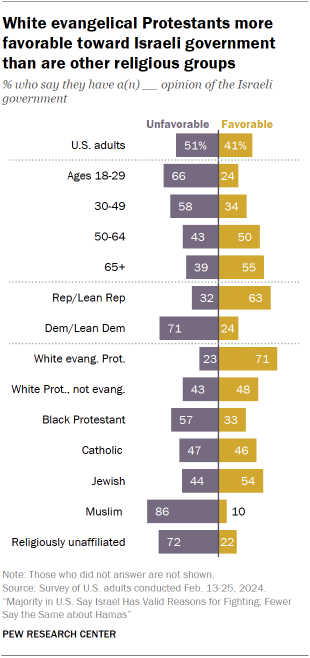
Four-in-ten Americans have a favorable view of the Israeli government, while 51% have an unfavorable view. The share of Americans who express a very unfavorable view of the Israeli government has grown in recent years, from 12% in 2022 to 21% today.
Age
Older Americans are more likely than young U.S. adults to take a favorable view of the Israeli government. Most of those ages 65 and older have a favorable view (55%), as do half of those ages 50 to 64. Fewer adults in their 30s and 40s (34%) and under 30 (24%) say this.
Since 2022, favorable ratings of the Israeli government have dropped among Americans under 50 (39% then vs. 31% today) and among those ages 65 and older (63% in 2022, 55% today), while remaining essentially stable among those ages of 50 to 64 (51% vs. 50%).
Party
Republicans and those who lean toward the Republican Party are more than twice as likely as Democrats and Democratic leaners to say they hold a favorable view of the Israeli government (63% vs. 24%).
Republican views of the Israeli government have remained relatively unchanged since 2022, but Democrats are less likely to have a favorable view in 2024 than they were two years earlier (24%, down from 35%).
Religion
Of the U.S. religious groups analyzed, White evangelical Protestants are most likely to express favorable views of the Israeli government (71%). Among Jewish adults, 54% say they have a favorable view of the Israeli government, while 44% take an unfavorable view.
On the other hand, 86% of Muslims have an unfavorable view of the Israeli government, as do 72% of religiously unaffiliated adults.
The Palestinian Authority
About a quarter of Americans (23%) have a favorable view of the Palestinian Authority, which controls the West Bank, while 68% have an unfavorable view.
While most Americans have an unfavorable view of the Palestinian Authority, 59% of U.S. Muslim adults take a favorable stance.
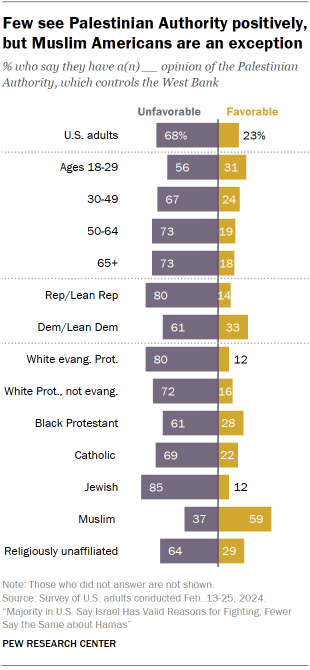
Hamas
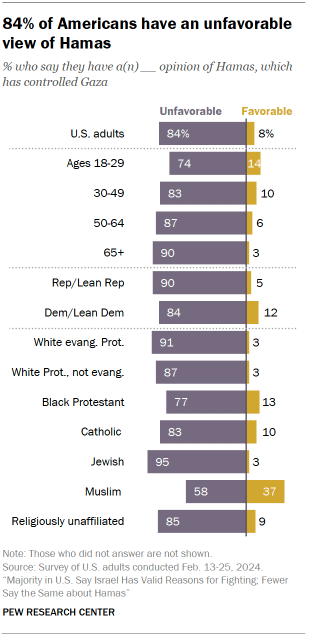
Just 8% of Americans say they have a favorable view of Hamas, which has controlled Gaza in recent years. Fully 84% have an unfavorable view, including 60% who express a very unfavorable view.
Across most demographic and religious groups analyzed, relatively few U.S. adults view Hamas favorably. Among U.S. Muslims, a 58% majority view Hamas unfavorably, while 37% hold favorable views.
Differences in views of Israelis, Palestinians and their leadership by age, political party
Younger Americans stand out from their older peers for having generally less positive views of both the Israeli people and the Israeli government, as well as for viewing the Palestinian people, Hamas and the Palestinian Authority relatively more favorably.
On balance, U.S. adults under 30 express more favorable views of the Palestinian people than of the Israeli people (60% vs. 46%). Outside of this age group, however, the pattern is reversed. Indeed, Americans ages 50 and older are about 30 points more likely to report favorable views of the Israeli people than of the Palestinian people.
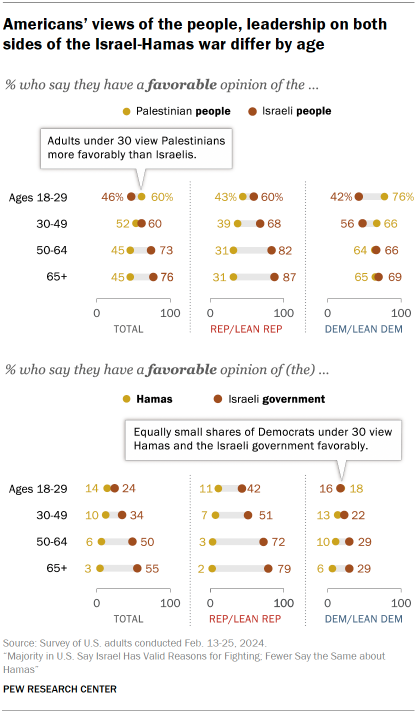
Political partisanship also matters. Republicans of all ages express more favorable views of the Israeli people than of the Palestinian people, but the gap is narrowest in the youngest age group.
Meanwhile, among Democrats, young adults tend to have much more favorable views of the Palestinian people than of the Israeli people. But Democrats ages 50 and older view the two people groups in a largely equal – and positive – light.
Across all age groups, more Americans express favorable attitudes toward the Israeli government than toward Hamas. But the gap in favorability is just 10 points among U.S. adults under 30 (24% vs. 14%), while it becomes progressively wider among older Americans, rising to about 50 points among those ages 65 and older (55% vs. 3%).
And, once again, the age patterns differ by political partisanship. Republicans of all ages are significantly more likely to take a favorable view of the Israeli government than of Hamas. While the gap in favorability is narrowest among Republicans under 30, it’s still around 30 points (42% vs. 11%). Notably, though, fewer Republicans under 30 express a favorable view of the Israeli government than do Republicans ages 50 and older.
Democrats under 30 hold both the Israeli government and Hamas in relatively low – and equal – esteem (16% and 18% favorable, respectively).




